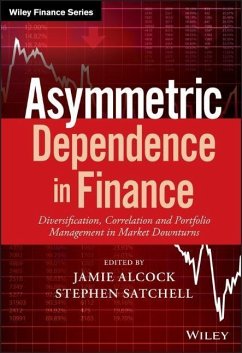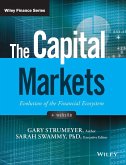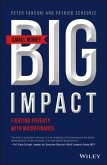Avoid downturn vulnerability by managing correlation dependency
Asymmetric Dependence in Finance examines the risks and benefits of asset correlation, and provides effective strategies for more profitable portfolio management. Beginning with a thorough explanation of the extent and nature of asymmetric dependence in the financial markets, this book delves into the practical measures fund managers and investors can implement to boost fund performance. From managing asymmetric dependence using Copulas, to mitigating asymmetric dependence risk in real estate, credit and CTA markets, the discussion presents a coherent survey of the state-of-the-art tools available for measuring and managing this difficult but critical issue.
Many funds suffered significant losses during recent downturns, despite having a seemingly well-diversified portfolio. Empirical evidence shows that the relation between assets is much richer than previously thought, and correlation between returns is dependent on the state of the market; this book explains this asymmetric dependence and provides authoritative guidance on mitigating the risks.
_ Examine an options-based approach to limiting your portfolio's downside risk
_ Manage asymmetric dependence in larger portfolios and alternate asset classes
_ Get up to speed on alternative portfolio performance management methods
_ Improve fund performance by applying appropriate models and quantitative techniques
Correlations between assets increase markedly during market downturns, leading to diversification failure at the very moment it is needed most. The 2008 Global Financial Crisis and the 2006 hedge-fund crisis provide vivid examples, and many investors still bear the scars of heavy losses from their well-managed, well-diversified portfolios. Asymmetric Dependence in Finance shows you what went wrong, and how it can be corrected and managed before the next big threat using the latest methods and models from leading research in quantitative finance.
Hinweis: Dieser Artikel kann nur an eine deutsche Lieferadresse ausgeliefert werden.
Asymmetric Dependence in Finance examines the risks and benefits of asset correlation, and provides effective strategies for more profitable portfolio management. Beginning with a thorough explanation of the extent and nature of asymmetric dependence in the financial markets, this book delves into the practical measures fund managers and investors can implement to boost fund performance. From managing asymmetric dependence using Copulas, to mitigating asymmetric dependence risk in real estate, credit and CTA markets, the discussion presents a coherent survey of the state-of-the-art tools available for measuring and managing this difficult but critical issue.
Many funds suffered significant losses during recent downturns, despite having a seemingly well-diversified portfolio. Empirical evidence shows that the relation between assets is much richer than previously thought, and correlation between returns is dependent on the state of the market; this book explains this asymmetric dependence and provides authoritative guidance on mitigating the risks.
_ Examine an options-based approach to limiting your portfolio's downside risk
_ Manage asymmetric dependence in larger portfolios and alternate asset classes
_ Get up to speed on alternative portfolio performance management methods
_ Improve fund performance by applying appropriate models and quantitative techniques
Correlations between assets increase markedly during market downturns, leading to diversification failure at the very moment it is needed most. The 2008 Global Financial Crisis and the 2006 hedge-fund crisis provide vivid examples, and many investors still bear the scars of heavy losses from their well-managed, well-diversified portfolios. Asymmetric Dependence in Finance shows you what went wrong, and how it can be corrected and managed before the next big threat using the latest methods and models from leading research in quantitative finance.
Hinweis: Dieser Artikel kann nur an eine deutsche Lieferadresse ausgeliefert werden.








